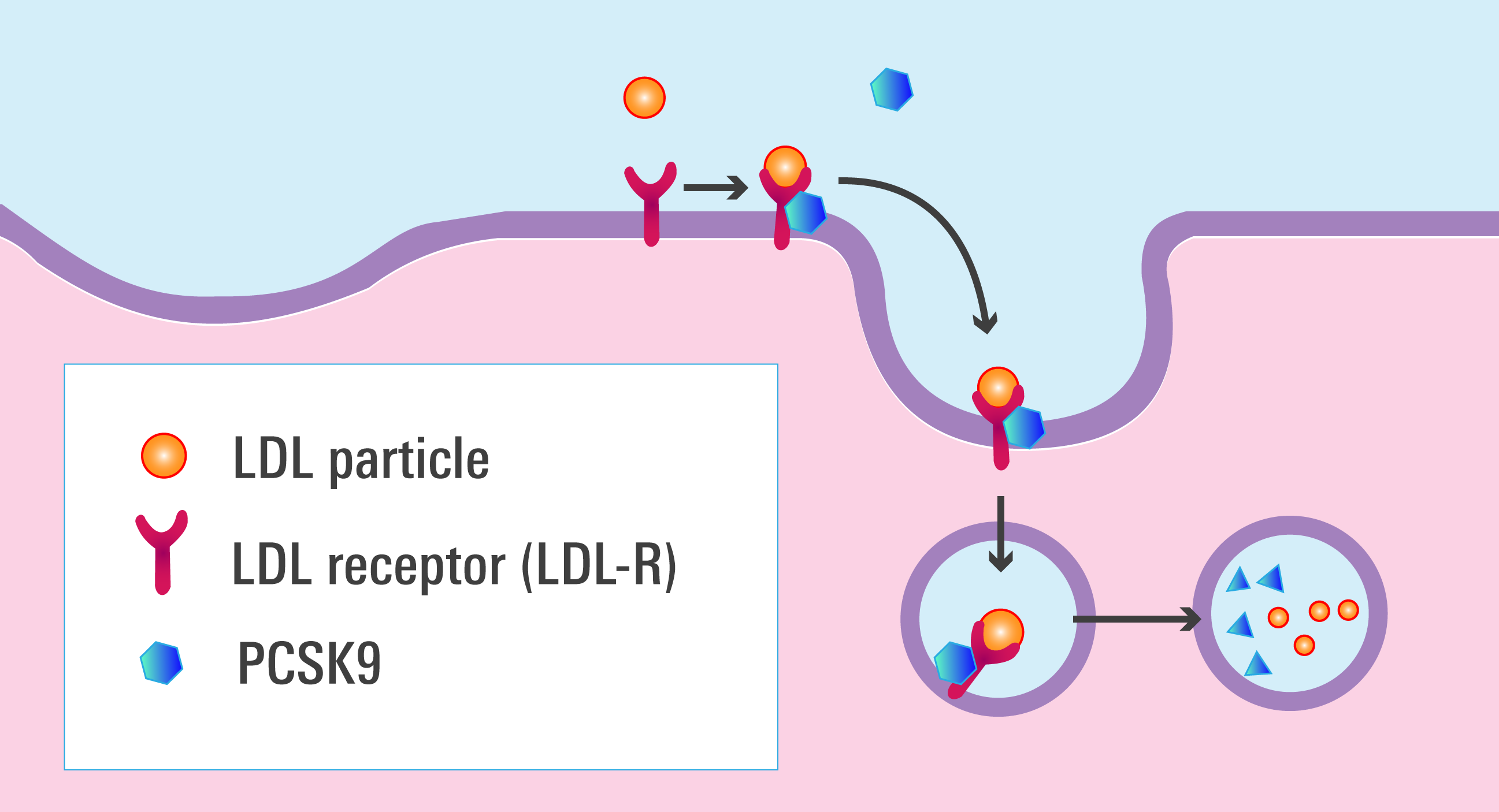Repatha vs Statins
Cholesterol is a type of fat molecule your liver produces. Although your body requires cholesterol to create healthy cells, having too much of it can raise your chance of developing heart disease.
Cholesterol can form fatty deposits in your blood vessels. Over time, the fatty deposits thicken and restrict the amount of blood that can pass through your arteries. It's also possible for these deposits to unexpectedly break off and create a clot that results in a heart attack or stroke.
High cholesterol is the leading risk factor for cardiovascular disease and heart attack. And although high cholesterol is genetic, it's usually brought on by poor lifestyle choices, making it both manageable and preventive.
A proper treatment plan with a heart-healthy diet and regular exercise is very important in lowering your cholesterol.
When lifestyle modifications are not enough to lower your cholesterol, a medication is required. Statins and PCSK9 inhibitors, including Repatha, are 2 types of drug classes of medications to treat high cholesterol.
Statins are considred as first-line therapy for high cholesterol. They have been extensively studied and are effective at lowering cholesterol. They are also available as cost-effective generic options.
In 2015, PCSK9 inhibitors including Repatha became available as a brand-new class of cholesterol medications. Repatha is typically considered as an additional treatment option if statins are not effective in reducing LDL cholesterol levels. However, it may be presribed by itself for patients with familial hypercholesterolimia (HeFH), a genetic condition that causes high cholesterol.
Statins and Repatha both are effective at lowering cholesterol. To choose the right medication for you, there are a number of factors to consider: your medical history, side effects, interactions, and cost.
How they work
Statins work by blocking a liver enzyme (HMG-CoA reductase) that's necessary for making cholesterol, leading to decreased cholesterol production. Repatha, on the other hand, works by blocking a protein (PCSK9) that is responsible for destroying LDL receptors. By blocking this protein, Repatha allows more LDL receptors to remove excess cholesterol from the body.
How PCSK9 inhibitors (Repatha) work
PCSK9 inhibitors work by targeting two key factors: LDL receptors (LDLR) and Proprotein convertase subtilisin/kexin type-9 (PCSK9).
LDL is a crucial component responsible for transporting cholesterol in the bloodstream. The LDL receptor's primary role is to clear the excess cholesterol from the body. These receptors are located on the surface of cells and bind to the LDL present in the bloodstream, bringing it inside the cell where it's broken down to release cholesterol. The cholesterol can then be used by the cell, stored, or eliminated from the body. After delivering the LDL, these receptors return to the cell surface to pick up more LDLs.
However, PCSK9 is a protein that can attach to LDL receptors and destroy them within the cell. This results in a lower number of LDL receptors available to clear excess cholesterol in the body, which can lead to an increase in cholesterol levels.


Repatha is a PCSK9 inhibitor, which means that it works by blocking PCSK9 from attaching to LDL receptors. By doing so, it allows LDL receptors to do their job effectively, removing excess cholesterol from the bloodstream. This helps to reduce cholesterol levels in the body and lower the risk of cardiovascular disease.


Repatha vs Statins: Which is better at lowering cholesterol?
Both drugs are effective at lowering LDL-C. However, statins are considered as the first-line treatment option for high cholesterol. Statins lower LDL-C levels by 30% to 50% depening on the strength. Repatha is usually recommended when statins or other cholesterol medication have not been successful at reaching your cholesterol goal. Repatha can be used as an adjunct therapy with a statin or a standalone therapy for people with heterozygous familial hypercholesterolemia (HeFH) which is a generic disorder that causes very high LDL cholesterol.
| Statins | Repatha |
| Typically lowers LDL by 30–50% | Typically lowers LDL by 50–60% |
Doses and administration
Repatha
Repatha is administered as a subcutaneous (SC) injection and can be injected into your thigh, upper arm, and/or stomach. Avoid picking a location where your skin is soft, damaged, red, or firm.
Do not inject near scarred or stretch-marked skin, and it's recommended that you use a different place each time you give an injection, therefore, you should not inject into the same place 2 times in a row.
- For HeFH or ASCVD: 140 mg SC once every 2 weeks or 420 mg monthly
- For HoFH: 420 mg SC once monthly. The 420 mg dose is generally given as three 140mg injections consecutively within 30 minutes or as a 420 mg single injection.
Protect against light and heat when storing Repatha in its original carton in the refrigerator, and avoid freezing.
Before injecting your dose, take Repatha out of the refrigerator and let it sit at room temperature for approximately 30–45 minutes.
Repatha can be kept at a cool room temperature, away from light and heat, in its original carton. If the medication is kept at room temperature, it should be used within 30 days.
Statins
There are 7 statins availble with following doses:
- Atorvastatin (brand: Lipitor): 10-80 mg daily
- Lovastatin (Altoprev): 20-80 mg daily
- Rosuvastatin (Crestor): 5-40 mg daily
- Simvastatin (Zocor): 10-40 mg daily in the evening
- Fluvastatin (Lescol XL (extended-release)): 20-80 mg taken in the evening
- Pitavastatin (Livalo, Zypitamag): 1-4 mg daily
- Pravastatin (Pravachol): 10-80 mg daily
Side effects
Repatha: common side effects
- Headache
- Upper respiratory tract infection (URTI), including cold or flu-like symptoms
- Urinary tract infection (UTI)
- Back pain, muscle pain, and/or joint pain
- Injection site reaction that may include a severe rash, redness, or any discoloration, bruising, and/or pain at the site of injection
Numerous medications have side effects that usually subside after a few days or weeks. However, talk to your physician or pharmacist if these adverse effects start to concern you.
Repatha: serious side effects
- Difficulty breathing and/or swallowing
- Increased blood pressure
- Increased blood sugar levels, which may result in diabetes
Signs and symptoms that may indicate high blood sugar levels include nausea or vomiting, blurred vision, increased thirst, confusion, and/or increased need to urinate.
- Allergic reaction
Signs and symptoms that may indicate an allergic reaction include skin rash or hives (raised bumps), excessive itching, and flushing such as redness, warmth, or deepening of skin color.
Although uncommon, a more serious allergic reaction is may occur. One of the signs of a severe allergic reaction is skin swelling, usually in your hands, feet, lips, eyelids, and/or lips. Additionally, swelling in your throat, mouth, or tongue, can make breathing difficulties may occur.
If you experience an adverse response to Repatha, contact your physician immediately. However, use 911 or your local emergency number if you believe you are experiencing a medical emergency.
What happens if I miss a dose of Repatha?
As long as it will be more than 7 days before your next dose, take the missed dose as soon as you remember. However, skip the missed dose and resume your regular dosing plan if there are 7 days or fewer until your next scheduled dose. Never take 2 doses at once to make up for missing ones.
If it has been greater than 7 days from your missed dose and you are using the every 2-week dose, inject the next dose based on your original schedule. You'll then be back on your previous schedule as a result.
If it has been greater than 7 days from your missed dose and you are using the 1-time each- month dose, inject the dose and start a new schedule using this date.
For guidance on what to do if you miss a dosage, talk to your physician or pharmacist.
Statins: common side effects
- Myopathy (muscle weakness, stiffness, spasms)
- Myalgias (muscle pain and/or soreness)
- Arthralgia (joint pain and/or aches)
- Cognitive impairment
- Headache
- Cold-like symptoms, including sore throat, stuffy nose, and/or sneezing
- Insomnia
- Nausea
- Heartburn
- Abdominal pain
- Indigestion
- Constipation
- Weakness
Certain patients find that consuming more vitamin D helps them stop experiencing muscle soreness or pain. For some, it's common to experiment with doses and switch statin medications until you discover the most appropriate statin that works best.
Do not abruptly discontinue taking your statin medication if you believe you are experiencing any negative side effects. Consult your doctor to determine whether a dose adjustment or switching to a different drug could be beneficial in your case.
Statins: serious side effects
- Difficulty raising your arms and/or difficulty rising or standing
- Muscle aches in your hips, shoulders, neck, and back
Taking large doses of statins can lead to the breakdown of your muscle cells and the release of myoglobin into your blood. Kidney damage and excruciating muscle pain or soreness may result from this.
- Hepatic (liver) issues, such as upper abdominal pain, weakness, fatigue, decreased appetite, dark urine, and jaundice (yellowing of the skin or eyes).
- High blood sugar or type 2 diabetes, especially if you already have high blood sugar levels.
- Kidney issues, such as little to no urination, ankle or foot swelling, fatigue, or shortness of breath.
- Confusion and/or memory problems
After taking statins, some patients have experienced memory loss and cognitive issues. However, several studies have not found any indication that statins are directly to blame for these issues. Statins may be able to help avoid these problems, according to other research.
If you’re experiencing any of the serious side effects listed above, immediately call your doctor and stop taking this medication.
Warning
Some individuals taking statins may experience blood in their urine, also called hematuria, or protein in their urine commonly referred to as proteinuria.
Speak With Your Doctor
Both Repatha and statins are considered safe and effective when taken appropriately (as prescribed by your doctor). Talk to your doctor today about using Repatha and statins and send your prescription to Marley Drug. Save up to 95% compared to your local pharmacy by using Marley Drug.
Marley Drug provides free nationwide shipping, allowing you to receive your medication at no additional cost straight to your door.